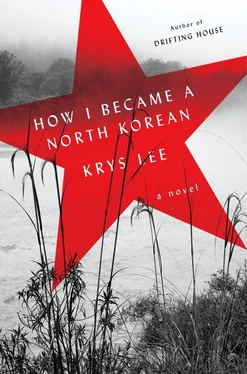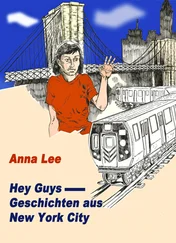Night passed into dawn into day then back into darkness. Clouds grouped together, broke apart, formed a claw. Our numbers had dwindled into the group that would cross, and at each checkpoint nearing the border the driver handed out money, alcohol, cigarettes, and packets of powdery bbindu to keep the security guards high. All around I saw the broken infrastructure and law of our country; there was nothing that couldn’t be bought, evidently, even our safety. All the while our eomeoni stayed as still as a frozen movie screen, unapproachable in the folds of her hooded coat.
The eomma ’s baby began wailing. He opened his tiny mouth and bellowed our misery. My fear was cold and rational. I wanted the baby quiet. I wanted the eomma to smother the crying lump of flesh hanging from her neck with the white cloth until it couldn’t make another sound, or to feed the baby another sleeping pill. To put to rest those desolate cries that made hope seem impossible. My dongsaeng was so tired that she slept through it all. I’m becoming half human, I thought.
“Shut it up or I’ll stuff it with rags!” screamed a man.
“Someone will hear us,” another said.
Salt filled my mouth. The baby’s cries became two slender arms that curled around my lungs, and my breathing slowed and thinned.
Only then did I ask Eomeoni what I couldn’t forget, the only question that mattered to me. “I’m his son. I need to know. Tell me: What happened to Abeoji?”
• • •
Mr. Choi appeared first as a voice in the dark. The beam of a flashlight aimed toward his own wide, flat nose was the first thing I saw at the border overlooking China. He had us hide from patrolling guards for two nights, waiting for the tightened security to lapse while we rationed our dwindling food supply, until he said it was safe to cross the Tumen River. I would remember the shaved head and the birthmark the shape of a smashed spider across the man’s left cheek, though not whether the man had been short or tall. Time has been generous that way, releasing me from one detail, then another.
As we were herded into a van that smelled of timber and wet paper, all I could see was the bullet tunneling into my abeoji ’s heart.
“They killed your abba, ” Eomeoni had whispered under the truck’s rumble, her lips pinched white as she told me what had happened that night. She spoke with her chin resting on the crown of my dongsaeng ’s sleeping head. “Maybe they would have killed me, too, even if I didn’t know anything about his foreign bank accounts. But the Dear Leader considered our good relationship.”
I don’t know if she told me the truth that night, or her version of the truth, a story more dramatic than the truth. All I have are her words. I wanted to know who was this “they” that my eomeoni ’s many alliances had saved us from. Who was always this “they”? My head filled with thoughts of Abeoji and the endless tomb of distances between us.
Still, how quickly I got into the van, as if afraid it would leave without me. A boy intent on living even if his abeoji was dead.
• • •
After we crossed the freezing river and dried off, we were taken by another car to a hut at the edge of a village. My first thought was: Too close. If we sneeze, the villagers will wake up. A car jutted out from the hut’s shadow. The blue metal of its door flashed open and a stranger jumped out. He looked at Mr. Choi, then lugged a lumpy sack out of the trunk and dumped out shirts and sweaters that flapped like ghosts in the dirt.
The stranger’s red leather jacket made me wary. It didn’t look like something a sane man should wear. The man counted us off out loud. Whatever he saw pleased him, for he smiled, flashing a gold filling, and said something in Chinese to Mr. Choi as he withdrew a fat envelope and slapped it into his waiting palm.
“The women first,” Red Leather Jacket said in our language this time. “Come on, you want to be buried here? Slower than cattle, these people!”
When my dongsaeng ’s nails dug into my palm, I said, “This place looks too exposed to be safe.”
Red Leather Jacket considered me.
“You’re from the south. Pyongyang? You’ve got the accent, the attitude. Young man, you better learn this quickly: You’re in China; now you’re nobody.”
The man directed the women to take turns climbing through the break in the wall where they would change into local clothing. We were sent in only after the women reemerged in their new garments. Inside, I tasted dandelions and dried fish and urine in the air. As motes of dust misted down from the roof, I gagged at rats with tails as long as rice stalks rattling in the dark corners.
“Others were here before us,” someone said.
In the light shooting through a crack in the roof, I saw plastic bags and empty bottles and flattened squares of straw and tarp for bedding. The hut, filled and emptied many times with the fleeing and the hiding, held the story of our people in its smells. But I didn’t think of myself as one of them yet.
I dressed slowly until one by one they left and I was alone again.
“Your first time crossing?” A boy’s voice, whistling through a gap between his front teeth, carried in the dark. “You’d do good to stick with me. I know my way around.”
The boy I would later call Namil hiccuped and came closer so that I smelled the alcohol on him. I saw his slight silhouette and his smile, so wide it was as if both sides were being pulled apart by strings. He pulled out a bun from his jacket pocket and tore it in half. “Here, you can have some.”
“Where did you get this?”
“The trash is high quality here, not like back home. You get fat off what they throw away, really! You’ll find out. And the Christians — the good ones — they’ll practically give you their house if you look young and sad and tell them you’re an orphan.”
But I wasn’t an orphan. I still had Eomeoni and my dongsaeng, one more long journey awaiting us from China to the safety of another country. The boy tucked the piece of bun in my hand though I wasn’t going to reduce myself to feeding off garbage. The rats stilled and became attentive. I stared at the stale bread, repulsed, but was touched by his kindness and pretended to take a bite of it.
At a rattling sound outside, the boy instantly turned wary. When a voice spiked in through the crack, he sank behind a couch with filling springing out of its seats. His speed, his animal intuition, made me feel soft, my brain padded by dull fatty layers that didn’t know how to read any of the signs around me.
Outside, I saw that Eomeoni had chosen only white clothes, the traditional color of mourning. Her knuckle was locked in her mouth, and I wondered if she was thinking about Abeoji. Or was she crying for our home, our lost lives? Only then I noticed, in the way that time became slow for me, that some men as large as sedans were now positioned behind Red Leather Jacket.
It was as if one of my mother’s film reels played in slow motion, the way our men lined up in front of the women. The way some of us were already turned sideways even while standing in front of our women, prepared to run. I stayed behind in the back with my eomeoni and my dongsaeng, and my hands found theirs without my knowing. A man was shouting, his face inches away from Red Leather Jacket’s droopy left eye.
“What are you doing with the baby?” he said.
One of the men trained a gun on him. He stepped back.
They had wrenched the baby from the eomma, and the eomma had collapsed at Red Leather Jacket’s feet, her hands curled around the tops of his shoes. A cry gurgled out of her as he kicked her away from him — I will never forget that sound.
Читать дальше












